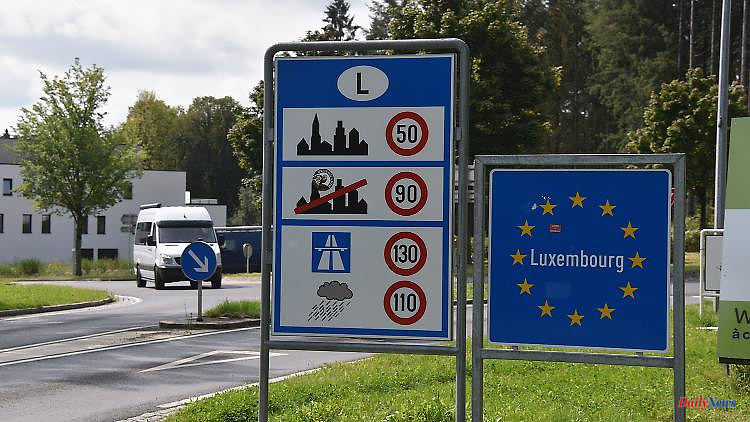Most Luxembourgers can also speak German. Over the years, however, German has developed differently in Luxembourg than in Germany. A German studies professor is now bringing out a dictionary.
The vacancy is the holidays, the bicycle is the bicycle and the open-air pool is the open-air pool: the German spoken in Luxembourg is a bit different from the German spoken in Germany. "One could say: There is an independent variety of German in Luxembourg," says Professor of German Studies Heinz Sieburg at the University of Luxembourg in Esch an der Alzette.
The peculiarities mainly concern the vocabulary. Born in Bonn, he has compiled around 1,300 keywords in research over the past ten years. He stated: "The French influence is to some extent a formative factor in the special development of the German language in Luxembourg." His overview of words from everyday life, politics and administration can be found in the first dictionary for "Luxemburger Standarddeutsch", which will be published by Dudenverlag in mid-October. It also picks up on the latest developments in contemporary language, as a spokeswoman for the publishing house in Berlin says.
There are words that can easily be identified as French loanwords - like Rentrée for the return of the students after the holidays or Chamber for Parliament. "It's normal for languages to borrow from other languages," says Sieburg. French-influenced words such as déjà vu, office, balcony or perfume are also commonplace in West German. While the "German German" is more influenced by Anglo-American today, in Luxembourg - which borders on France - the French leaning influence continues.
The dictionary also contains terms that are not immediately clear to non-Luxembourgers: for example, municipal mother for mayor, body search for body search or autonomy for the range or charging capacity of a battery. And then words that you can guess: open-air pool for open-air pool, parking for parking space and caddy for shopping trolleys. In Luxembourg, one also "takes notes" and doesn't make them. And sanitary precautionary rules in times of a pandemic are sometimes called barrier gestures.
In Sieburg's view, it is important to value German in Luxembourg as an equal variant of the norm. And not, as sometimes happens in Luxembourg, to regard differences "as mistakes". If a language debate is stimulated by the dictionary in the Grand Duchy: "Then that's good from my point of view," says the professor of German linguistics and historical linguistics of German as well as German medieval studies.
Since the beginnings of the university in Luxembourg in 2003, he has been teaching in the Grand Duchy, he runs several German courses at the Esch site with a total of around 100 German studies students. German is a common language in Luxembourg. Children learn to read and write in German at school - and often use it as the language of instruction. In addition to Luxembourgish and French, German is the administrative language - and the preferred language of the print media. With around 630,000 inhabitants, the Grand Duchy is the second smallest country in the EU.
According to the government, the majority of Luxembourgers speak four languages, and the proportion of foreign residents is almost 50 percent. According to a study by the Ministry of Education (2018), 98 percent of the Luxembourg population speak French, 80 percent English and 78 percent German. Luxembourgish is used by 77 percent of the population.
Even if Luxembourgish is the national language, German is also part of the country's linguistic and cultural heritage, says Sieburg. Many are not aware: "The beginnings of the written form of German can be found in Luxembourg." These are handwritten entries (glosses) from the 8th century that were created in the Benedictine Abbey of Echternach. "From then on there was a continuous German language, which can also be seen in documents and in the literature," he says.
German has also developed differently in Austria and Switzerland. In Austrian German, whipped cream was called whipped cream and tomato tomato. "These are not deviations from a "monostandard" that is set in Germany, but standard variants," says the professor. Today one is away from the idea: "There is a domestic German and around it somehow so funny border German."
Similar dictionaries (Duden) have already been published for German in Austria and Switzerland. The spokeswoman for Dudenverlag says: "As reference works for the national variants of German, the dictionaries are very relevant both for writers and speakers in the respective countries as well as in Germany." Both previous books for Austria and Switzerland are constantly being updated and expanded. "And they are still in demand." Sieburg's book is the first dictionary that exclusively and comprehensively shows German in Luxembourg.
Sieburg only included terms in his dictionary when they regularly appeared in various newspapers several times. "It has to be standardized and not a flash in the pan," he says. With the book, he also wants to help non-Luxembourgers to look up and understand the terms. "It's also about preventing misunderstandings." As an example, he cites the word rendezvous, which is used in Luxembourg for any type of meeting. "You also have a date with a doctor," says Sieburg.












